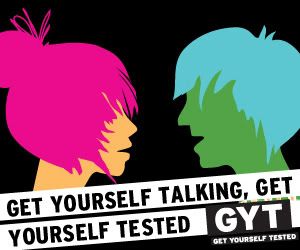
[I'm busy studying for finals. In the meantime, enjoy this guest post by Jack. I think it's important information for people who've learned testing is important but are unsure what to expect when they actually go through the process. -Holly]
A good friend of mine recently had an STD scare. I figured I might as well get a physical/emotional clean slate myself, and more importantly, go through the experience to support my friend, who has been distraught and has a horror of needles that rivals yours.
[Jack once stuck me with a play piercing needle because we were curious if I would like it. My reaction was a calm and level-headed "GET IT OUT GET OUT OH GOD GET IT OUT AUUUUGH." -Holly]
She did the basic research over the internet and phone; two places in Boston, Boston Medical Center and Mass General Hospital, offer free STD clinics. If you work normal day hours like me, expect to take a day off to get in to be tested – the late Wednesday hours are generally packed, they said. You have to give your name, address, and date of birth to book an appointment.
[I edited out some Boston-specific details here; after finals I'll put together a "Boston sexual health resources" page to accompany the kink resources. -Holly]
They take almost every insurance plan. They also do testing free if you have no insurance (and they’re a public health clinic, so they ask if you have insurance but don’t look into it – and don’t much care – if you say you don’t), but only if you are symptom-free. This struck me as kinda odd, and I wasn’t able to ascertain the reason behind it. They test for gonorrhea, chlamydia, syphilis, and HIV; they'll also test for hepatitis C if you request. They also offer the three-shot hepatitis A and B vaccines for free if you want them. This is a separate appointment from your STD testing.
So you walk in and take the elevator up to the clinic; when you walk up to the desk, the desk workers are rather apathetic. “You’re here for what? Huh? Oh. Fill out the form.” They have you fill out a basic form with name/address/phone number/do you have insurance/how did you hear about us, then call you in when it’s your turn.
You have to go in alone; it’s completely private – they wouldn’t let me go in with my friend, despite her and I asking if I could. The actual person who does the testing is polite, warm, and professional, very matter-of-fact but not cold. They explain that the HIV screening is a rapid reaction test with results in 20 minutes, and that the other results take a week or so to come back from the state lab – they do a pretty good job of calmly, simply walking you through everything, showing you lists of information and such, and answering your questions.
One big catch: If you come back positive for anything, you have to come back in to the clinic within a week of that call for more information and (free) treatment, or they turn your information over to the state, which will track you down as a public health risk. Aside from the threat-to-the-public good aspect, everything is 100% confidential regardless of age/status/etc. – apparently even if they have to track you down with the police it’s a private deal; the police bring you to a state doctor who works with you in private.
[Don't get too scared by this--it's actually pretty extraordinary for the cops to hunt someone down for medical treatment--but do be aware you take this risk if you get tested for anything you're not willing to be treated for. -Holly]
The physical part of the procedure is fairly simple: they do the standard spring-loaded finger prick for the HIV test; they put a very small needle (21 gauge) into your arm and draw two small tubes of blood (the needle’s in your arm for less than two minutes, I never even felt it); then they walk you down to the bathroom and hand you the urine cup (“half full, please”) and wait for you, then take it from you when you walk out. The whole thing is very private, very professional, standard doctor’s-office, alcohol-swab-and-stick routine. Your name is not written on the specimens; you're identified only by a number and barcode.
After that they send you back to the lobby (and give you juice and cookies, if you’re like my friend and look chalky-white and like you’re going to die after the needle stick). Within 20 minutes they call you in and tell you that your HIV test was negative (I’m not sure what they do if you’re positive – Bells and whistles? Herd of lemmings? Dunno), and that that roughly means that you aren’t positive, although if you were infected in the last few weeks it may not show up. The other tests take 48-72 hours; if they don't call you, after a few days you can call the phone number and and hear your results over the phone--but if you test positive, they will call you.
[What actually happens if you test positive for HIV is a lengthy meeting with a counselor to tell you "this does not mean you're dying, you can be healthy for many years after this, but we need to get you started on treatment ASAP and here's how that's going to work." They also retest you with a slower but more accurate method to make sure. -Holly]
They reiterate the we’ll-call-you-if-bad, you’ll-hear-a-few-days-later-if-it’s-good, feel-free-to-call-after-a-few-days-if-you-want-to routine, and then they wish you a good day. Other than the apathetic desk attendants it was professional and friendly friendly, anonymous, non-judgmental, and pretty low-key.
0 comments:
Post a Comment